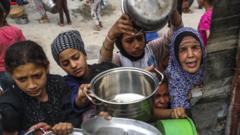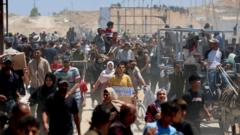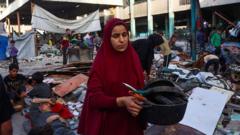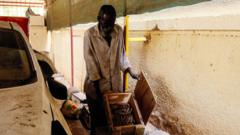The recent arrest of Ataullah, leader of the Arakan Rohingya Salvation Army, in Bangladesh raises significant concerns regarding the ongoing situation of over a million Rohingya refugees, who continue to suffer from violence and displacement.
Arrest of Rohingya Group Leader Highlights Ongoing Crisis in Bangladesh

Arrest of Rohingya Group Leader Highlights Ongoing Crisis in Bangladesh
The apprehension of Ataullah, head of the Arakan Rohingya Salvation Army, unveils critical issues facing Rohingya refugees in Bangladesh amid increasing violence.
The leader of the Arakan Rohingya Salvation Army (ARSA), Ataullah, has been arrested in a police raid in Bangladesh, raising further scrutiny over the situation of the Rohingya community. The police captured Ataullah along with nine other suspected members of ARSA on Monday in Narayanganj District, near Dhaka. They face charges under Bangladesh's antiterrorism law.
The ARSA group, representing the persecuted Rohingya people from Myanmar, has been accused of launching attacks that the Myanmar military used to justify a brutal campaign of ethnic cleansing against the Rohingya. In 2016 and 2017, coordinated ARSA assaults on security outposts prompted a severe military “counter-offensive,” resulting in mass displacement and what has been recognized by the United States as genocide.
Currently, over a million Rohingya are living in makeshift camps in Bangladesh, including the world’s largest refugee settlement in Cox’s Bazar. This population has been left vulnerable to violence, including clashes between rival militant factions like ARSA, exacerbating the crisis and breeding further desperation among the youth in these areas.
Despite the arrest of Ataullah, the ongoing violence within the refugee camps introduces an unsettling layer to the plight of the Rohingya, who remain trapped in a cycle of trauma and unrest.
The ARSA group, representing the persecuted Rohingya people from Myanmar, has been accused of launching attacks that the Myanmar military used to justify a brutal campaign of ethnic cleansing against the Rohingya. In 2016 and 2017, coordinated ARSA assaults on security outposts prompted a severe military “counter-offensive,” resulting in mass displacement and what has been recognized by the United States as genocide.
Currently, over a million Rohingya are living in makeshift camps in Bangladesh, including the world’s largest refugee settlement in Cox’s Bazar. This population has been left vulnerable to violence, including clashes between rival militant factions like ARSA, exacerbating the crisis and breeding further desperation among the youth in these areas.
Despite the arrest of Ataullah, the ongoing violence within the refugee camps introduces an unsettling layer to the plight of the Rohingya, who remain trapped in a cycle of trauma and unrest.























